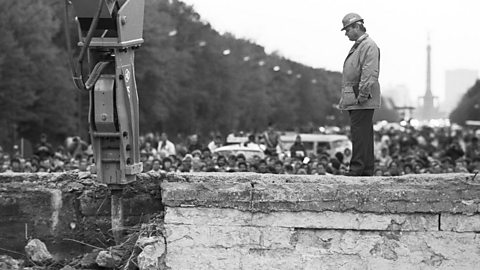What caused the Korean War?
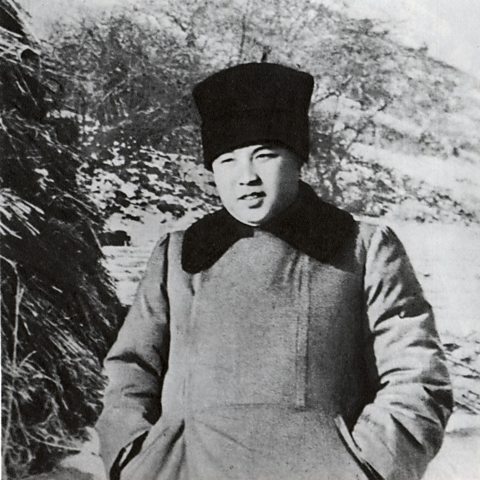
After World War Two, Korea had been divided at the 38th parallelA latitudinal border line, the border between North and South Korea. into the Soviet-backed communistSomeone who believes in the political ideology of communism, a system of running a country in which all means of production such as tools, factories and raw materials, are owned by the community as a whole. Private property does not exist and each individual contributes according to their ability and receives according to their needs. This means there is no hierarchy of social class. North Korea, led by Kim Il Sung, and non-communist, American-backed South Korea under the leadership of Syngman Rhee.
Neither leader in Korea had been elected nor did either recognise the legitimacy of the other.
However, Rhee was a corruptWhen a person, company or country acts in a dishonest way for their own personal gain. and unpopular leader and did badly in the April 1950 elections when many in the south voted for reunification with the North.
In June 1950, with the support of China and the Soviet Union, North Korea launched an attack on South Korea across the 38th parallel.

Why did Korea become a Cold War battleground?
Why did the USA get involved?
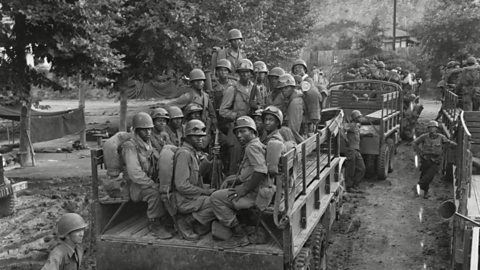
- The USA believed it could win and that China would not intervene.
- The advance of communismA system of running a country in which all means of production such as tools, factories and raw materials, are owned by the community as a whole. Private property does not exist and each individual contributes according to their ability and receives according to their needs. This means there is no hierarchy of social class. elsewhere made America more determined. For example, China turning communist in 1949.
- The USA wanted not just to contain communism - they also wanted to prevent the domino theoryAn American belief that if one country became communist, others would quickly follow; like a row of dominoes falling down and knocking each other over. . Truman was worried that if Korea fell, the next country to fall would be Japan.
- The Truman DoctrineEstablished in 1947 by President Harry S Truman, this policy provided US military and financial aid to countries that were at risk of being taken over by communists. had promised to help countries who were threatened by communism.
- The USA believed that the USSR was behind the North Korean invasion and they were determined to stop Stalin.
Why did the USSR get involved?
- It was part of Soviet ideologyA set of ideas or thoughts that someone, or a group of people, believe in. The plural of this is 'ideologies'. to spread communismA system of running a country in which all means of production such as tools, factories and raw materials, are owned by the community as a whole. Private property does not exist and each individual contributes according to their ability and receives according to their needs. This means there is no hierarchy of social class.which is what Kim Il Sung was trying to do.
- Stalin wanted to see communism expand as long as he did not get involved in a âhot warâ with the USA.
- Stalin wanted to avoid Korea becoming a Chinese satellite stateAn officially independent country that is strongly influenced or controlled by another country..
Why did China get involved?
- China feared an American invasion.
- North Korea as a communismA system of running a country in which all means of production such as tools, factories and raw materials, are owned by the community as a whole. Private property does not exist and each individual contributes according to their ability and receives according to their needs. This means there is no hierarchy of social class. country provided a buffer zoneAn area giving someone protection against a threat, eg the USSR wanted a buffer zone around them after being invaded by Germany in both World Wars. for China.
- The Sino-Soviet Treaty of Friendship, Alliance and Mutual Assistance with the USSR meant that, as their ally, China was under pressure from Stalin to help Korea.
The key events of the Korean War
| Date | Events |
|---|---|
| June 1950 | The North Korean Peopleâs Army advanced quickly and pushed the Southern forces to a small area around Pusan in South Korea. |
| July 1950 | The USA sent troops to support South Korea and also appealed to the United Nations (UN)The successor to the League of Nations, the United Nations was established in 1945 as an international organisation designed to keep peace, uphold international law and set standards in human rights. for help. Its UN's Security CouncilA group of 15 member countries who determine the existence of a threat to peace or act of aggressionagreed to send troops. |
| September 1950 | UN forces, led by the American General Douglas MacArthur, landed in Inchon and quickly pushed the North Koreans back over the 38th parallelA latitudinal border line, the border between North and South Korea.. By October 1950, they had almost rolled back the communistSomeone who believes in the political ideology of communism, a system of running a country in which all means of production such as tools, factories and raw materials, are owned by the community as a whole. Private property does not exist and each individual contributes according to their ability and receives according to their needs. This means there is no hierarchy of social class. to the Yalu River on the border with China. |
| October 1950 | Not wanting a US-backed state on its border, China invaded Korea and drove the UN forces back below the 38th parallel. General MacArthur called for the use of atom bombA nuclear weapon that releases a huge amount of energy by splitting atoms. They can cause enormous amounts of death and damage when dropped on an area. to defend Korea but this was denied by President Truman and MacArthur was sacked. |
| June 1951 | More UN troops were deployed to Korea and the communists were eventually driven back to the 38th parallel. The war became a stalemateA situation where neither side can win.. The war then took to the skies, where American and Soviet pilots fought for a further two years. The Soviet pilots were dressed in Chinese uniforms flying planes with Chinese markings. |
| November 1952 | Republican PartyOne of the two major American political parties. Republicans tend to hold a more conservative viewpoint on politics and society. General Dwight D. Eisenhower won the US presidential election, promising he would go to Korea to see how the war could be ended. |
| July 1953 | An armistice (a formal agreement made by groups or countries at war to stop fighting) was signed at Panmunjom on the 38th parallel, which left Korea divided as it had been in 1950, and still is today. |
A summary of troop movements during the Korean War
The role of China and the USSR
China
MacArthur and the United Nations (UN)The successor to the League of Nations, the United Nations was established in 1945 as an international organisation designed to keep peace, uphold international law and set standards in human rights. crossing the 38th parallelA latitudinal border line, the border between North and South Korea. worried China.
The Chinese issued a warning to the UN but this was ignored.
MacArthur continued to push the UN troops into North Korea as far as the border with China.
China responded to the approaching UN force by sending over 250,000 Chinese âvolunteersâ into North Korea.
These volunteers helped to push the UN forces back across the 38th parallel.
USSR
Despite its denials at the time, the Soviet Union was intimately involved in the Korean War.
It provided âadvisors,â medical services, weapons and MiG-15 fighter jets.
Soviet pilots also flew aircraft with Chinese or North Korean markings.
Question
Why did the USSR not enter the war directly?
The USSR was afraid of provoking a World War and therefore helped the North Koreans and the Chinese through indirect or covert methods.
The consequences of the Korean War
For Korea
- 3-4 million Koreans died in the war which had resulted in a slight change to the border.
- The relationship between North and South Korea was bitter and tense.
- The war was disastrous for all of Korea, destroying most of its industry.
For the USA
- containmentAn American policy to try and stop communism from spreading to other countries. had worked. communistSomeone who believes in the political ideology of communism, a system of running a country in which all means of production such as tools, factories and raw materials, are owned by the community as a whole. Private property does not exist and each individual contributes according to their ability and receives according to their needs. This means there is no hierarchy of social class. had not spread (domino theoryAn American belief that if one country became communist, others would quickly follow; like a row of dominoes falling down and knocking each other over.) and so America increased her commitment to the Truman DoctrineEstablished in 1947 by President Harry S Truman, this policy provided US military and financial aid to countries that were at risk of being taken over by communists. and their policy of containment.
- US-Chinese relations worsened.
- America signed a treaty with Japan.
- The USA made a series of alliances including one with the Philippines and in 1951 they signed the ANZUS Pact with Australia and New Zealand.
- NATONorth Atlantic Treaty Organisation - a military alliance of Western powers originally set up (in April 1949) to provide a counterforce to the Soviet armies of Eastern Europe. became a military alliance.
- The war led to massive American rearmament Manufacturing arms to support a growing military.
For China and the USSR
- The war increased tension between the USSR and China as they squabbled over who should pay the bill for it.
- The Chinese came to feel that the Soviet Union was both an unreliable and demanding ally and so in 1960, China broke from the Soviet Union in an event known as the Sino-Soviet Split, creating tension amongst all communistSomeone who believes in the political ideology of communism, a system of running a country in which all means of production such as tools, factories and raw materials, are owned by the community as a whole. Private property does not exist and each individual contributes according to their ability and receives according to their needs. This means there is no hierarchy of social class. powers.
Impact on international relations of the Korean War
- The war demonstrated the determination of the USA to contain communismA system of running a country in which all means of production such as tools, factories and raw materials, are owned by the community as a whole. Private property does not exist and each individual contributes according to their ability and receives according to their needs. This means there is no hierarchy of social class. on a worldwide scale.
- The war established the pattern whereby if one superpowerCountries who have huge influence or strength, giving them significant global power. was directly involved, the other was indirectly associated.
- The temporary division of Korea along the 38th parallelA latitudinal border line, the border between North and South Korea. was a success for the policy of containmentAn American policy to try and stop communism from spreading to other countries., as communism did not spread into South Korea.
- The war revealed that China was no longer weak and was prepared to stand up to the West.
- The split between China and the USSR was influenced by the Korean War and shaped relations between the two countries until 1989.
Test your knowledge
More on International relations, 1945-2003
Find out more by working through a topic
- count8 of 13
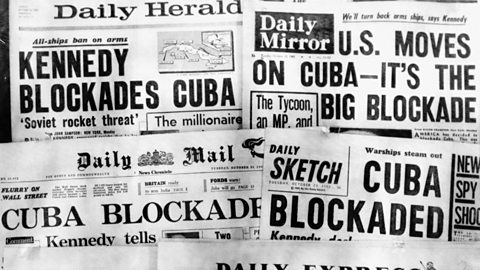
- count9 of 13
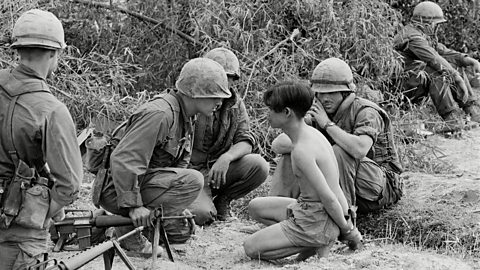
- count10 of 13
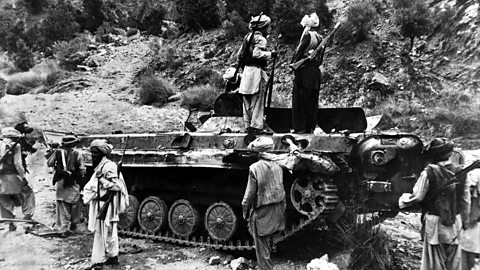
- count11 of 13
